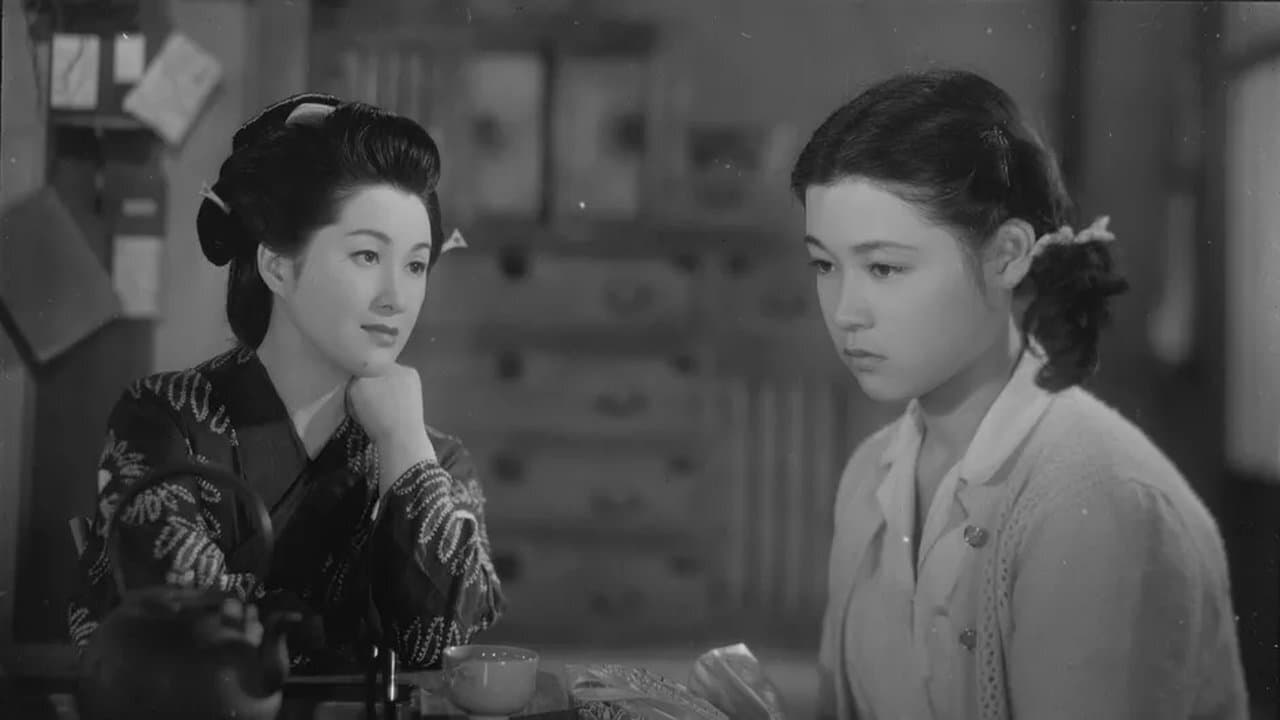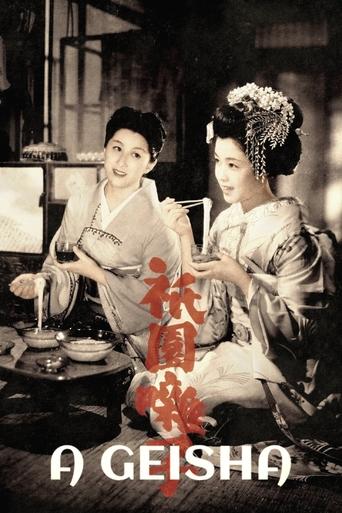

A GEISHA is Miyagawa's late stage threnody with regard to those he has been steadily paying commiserations through his formidable cannon, namely, ordinary lives on the low-rung. The English title may misguide audience by implying a young geisha's Bildungsroman in the Post- WWII Japan, that is quite right, but it only constitutes half of the story. In the beginning we are introduced to a 16-year-old Eiko (Wakao), arrives in Kyoto's Gion district and entreats named geisha Miyoharu (Kogure) to take her in as an apprentice. Eiko is saddled with her own tale of woe, his mother, a formal geisha and Miyoharu's friend, died young, her father Sawamoto (Shindô), a businessman on his irretrievable downturn, doesn't want anything to do with her. So being a geisha is her only outlet in this callous world and she takes great pride in this line-of-work, which is referred as "living works of art, intangible cultural assets" by her trainer, and resolves to not let anything cripple her work ethic, which means she will do best to please her patrons but will not be foisted into prostitution. She knows nothing about the delicate sex politics of the demimonde, so we need another character to tread into the underbelly. Miyoharu, who gives us a first impression of materialistic and impassive when she rebuffs a client who cannot afford her service (for three months indeed), lends herself on a mother-sister figure towards the young and imprudent Eiko, and through her tactful mediation and altruistic deeds, she manages to give Eiko a decent debut merely after one-year of training, and immediately Eiko gets the attention of the district's biggest patron Kusuda (Kawazu), who is habitually prefers new blood, whereas Kanzaki (Koshiba), Kusuda's young business associate, has a different taste in women, and takes a liking to Miyoharu. Only if both Eiko and Miyoharu would settle for these unsavory but finance-secured arrangements, there would be no kerfuffle ensuing. What happens next is inevitable when Eiko violently offends Kusuda's advances and puts their livelihood in jeopardy. Some ruffled feathers must be smoothed, and Sawamoto's gnarly advent to solicit money rubs salt into their affliction, what alternative do they have? The ending will have its say, as profound as it is poignant. What ultimately striking a chord in A GEISHA is Mizoguchi's deeply affectionate manifesto of the strength between two women, they are not consanguineous, yet, their rapport is so transcendentally dignified and soul- stirring because sometimes life could be hell but that shouldn't be the end of it, no despair needed when we can hold each other's hands and solider on. Scale-wise, A GEISHA is on the lightweight end in Mizoguchi's yardstick, but nonetheless peppered with compositional circumspection and gifted with superlative emotional repercussions predicated on a string of prominent performances: Michiyo Kogure is beguilingly versatile which sounds like a lesser statement, checking the scenes where she wonderfully lets on courtesy, empathy, scorn and compassion alternatively when facing off an equally competent Eitarô Shindô as the grasping, repugnant Sawamoto, that is some fine acting chops; a callow Ayako Wakao is also well-attuned to Eiko's characteristics, not a soft touch as she appears and lastly, a shout-out to Chieko Naniwa, who inhabits herself so naturally as Madame Okimi, a woman who can commandeer the whole district on her say-so on top of her ever-pleasant-and-earnest camouflage. A GEISHA is after all, one of Mizoguchi's best and rightly deserves the garland.
... View MoreKenji Mizoguchi, an important figure in the history of Japanese cinema, is very well known for his collaboration on the portrayal of Japanese women on screen; one of the first reasons for this being his sister, who was sold to a geisha house by his father's decision. This highly contributed to his attachment to highlighting women on his films.This is another film where geishas and their lives are involved. The story concerns one geisha and her apprentice, who is supposed to have the will to take the training into full practice and seriousness. Everything seemed fine when the training was in process, but when it came to conclusion, Eiko (the apprentice) had to debut as a geisha, but could not bring herself to accept her chosen client. Likewise, Miyoharu (Eiko's trainer), finds trouble when rejecting a client in love with her. Both rejected clients happened to be wealthy businessmen important to the geisha house where they worked, thus finding problems from there on.While the film may not be Mizoguchi's best, I can assure it is a wonderful joy to behold its cinematography. The camera positions and movements are just something to appreciate, accompanied by a totally honest and credible acting by pretty much every actor/actress involved.If you have liked everything you have seen from this wonderful director, there is absolutely not any reason why you should not get your hands on this film.My score: 7.5/10
... View MoreThis is the story of a woman who becomes a Geisha. She is never given any choice and she becomes a virtual slave to the system. In essence, its as if the was sold to the owner of the stable of Geishas. Then, after all her training and money spent making her the perfect host and performer, her "owner" expects the girl to pay her back by sleeping with her clients--whether or not she finds them repellent or not. The girl objects and is abused and threatened until she complies. A TOUGH movie to watch, indeed.This movie is diametrically opposed to the documentaries I have seen about the lives of Geishas. They portray the women as entertainers and say they do NOT sleep with the clients--unless, of course, one agrees to do this on her own. This may be true now, but I know that this was not always the case--particularly with women the Japanese kidnapped from Korea and other parts to be "comfort women"--less "Geishas" with all their training but more glorified prostitutes.A very unusual and interesting film that will also tug at your heartstrings for this poor girl.
... View MoreI liked this better than the more schematic SISTERS OF THE GION. This story of an established geisha who takes on a younger one as a sort of apprentice has engaging characters and a quiet, low-key, intimate realism that's highly effective.Since it's Mizoguchi, you know the direction, casting, lighting, sets, framing -- all the mise en scene -- are exquisitely sensitive and artistic. The acting is excellent, subtle and believable. Everything is "right", one might even say "perfect" -- an adjective one is tempted to apply to this director's work at its best. Every shot is beautifully, often breath-takingly conceived and executed.The glimpses this film gives of the rigorous training and daily life of traditional geishas are a big plus that adds greatly to its interest.Mizoguchi made poetry with a movie camera, and I would call A GEISHA one of his best films.
... View More